Eo – The Sign of the Prophet Jonah Matthew 12: 38-41
The Sign of the Prophet Jonah
Matthew 12: 38-41
The sign of the prophet Jonah DIG: Why do you think the Pharisees wanted to see a miracle? How does Jesus feel about this generation? Why? What is the sign of Jonah? How is Yeshua greater than Jonah? How might the Pharisees have interpreted this?
REFLECT: Have you ever asked God for a sign? Is it biblical? Is there a difference between confirmation from ADONAI and a sign? Where do we get confirmation from?
After hearing Christ’s words of rebuke and judgment for blaspheming the Holy Spirit, some of the Pharisees and Torah-teachers (to see link click Co – Jesus Forgives and Heals a Paralyzed Man) tried to retake the offensive by saying: Teacher, we want to see a sign from You (Mt 12:38). That they answered His sharp denunciation by asking Him a superficially respectful question indicated that they were biting their tongues were determined to give the impression of civility until determining the best time to attack Him.
The Rabbi from Galilee categorically refused to grant them a sign, but directed them back to two incidents in the TaNaKh. The first incident is the account of the prophet Jonah who was raised from the dead after being swallowed by a whale (see my commentary on Jonah Ar – The LORD Prepared a Great Whale to Swallow Jonah). The second incident that Jesus referred to concerns Solomon (see Ep – The Queen of the South will Rise with This Generation and Condemn It). Jesus was greater than Jonah and greater than Solomon. The queen of Sheba heard of Solomon and traveled from the ends of the earth to hear his wisdom. Conversely, Messiah had come from heaven, and yet the Pharisees and Torah-teachers would not listen to Him.669
The Pharisees and Torah-teachers did not consider anyone outside of their own party to be qualified to teach them anything. So, when they addressed Yeshua as teacher, their response was both sarcastic and hypocritical. It was sarcastic because they considered the Nazarene to be a heretic and blasphemer, and merely looked for a way to expose Him as a false teacher. It was hypocritical because they mocked Him in front of the crowd.
The kind of sign they wanted was not specified, but it must have been a whopper, probably something on a worldwide magnitude. The miracle-working Rabbi had already performed three messianic miracles (see my commentary on Isaiah Gl – The Three Messianic Miracles). But, they wanted more on an even greater scale.
The rabbis teach that a rabbi named Eliezar was challenged about his authority to teach. To prove his qualifications, he is said to have made a locust tree move 300 cubits and a stream of water flow backwards. When he caused the wall of a building to lean forward, it was returned upright only by the bidding of another rabbi. Finally, Eliezar cried out, “If the Torah is as I teach, let it be proved from heaven.” At that time (as the story goes), a voice came out of the sky saying, “What have you to do with Rabbi Eliezar? The instruction is as he teaches.”
It was not that the Pharisees and Torah-teachers really expected Yeshua to perform any such sign because their very purpose was to prove He could not do such a thing and thereby to discredit Him in the eyes of the people. Even though no prophecy in the TaNaKh ever foresaw that the Meshiach would perform a sign on the magnitude they demanded, the Jewish leaders gave the impression to the people that it did.670
The maverick Rabbi responded to their sarcastic challenge by first declaring that the very fact that they were asking for a sign reflected the evil expectations of their wicked and adulterous generation (Mt 12:39a). Their flawed acceptance of the Oral Law (see Ei – The Oral Law), led them into a superficial, self-righteous, and legalistic belief system. The Great Sanhedrin (see Lg – The Great Sanhedrin) had led the nation astray.
Consequently, Jesus said that no such sign would be given (Matthew 19:39b). It wasn’t possible for Christ to perform the kind of miracle that the Pharisees and Torah-teachers wanted – not because He didn’t have the power to do so, but because it was totally contrary to ADONAI’S nature and plan. God was not, and is not, in the business of satisfying the whims of wicked people who have no relationship with Him.

Nevertheless, the Lord declared that another kind of sign would be given: the sign of the prophet Jonah. Yeshua had already changed His policy regarding signs (see En – Four Drastic Changes in Christ’s Ministry). So, as a result of this new policy, He now said: For as Jonah was three days and three nights in the belly of a whale (see my commentary on Jonah At – Jonah’s Prayer), so the Son of Man will be three days and three nights in the heart of the earth (Matthew 12:39c-40). God brought Jonah out of darkness and death into the light and life. Jonah’s experience was a snapshot of the coming burial and resurrection of Jesus. The religious leaders from Jerusalem would not understand the illustration, but, those of faith would.
Continuing with His illustration from the life of Jonah, Christ contrasted the response of the pagan Ninevites to Jonah’s message with the response of the Pharisees and Torah-teachers to His. In one of His most biting rebukes, the Nazarene told the self righteous Jewish leaders, who thought they were the cream of the crop of God’s people, that the men of Nineveh will stand up at the judgment with this generation and condemn it; for they repented at the preaching of Jonah, and now something greater than Jonah is here (Mattityahu 12:41).
Despite Jonah’s reluctance to preach God’s message to the evil and idolatrous Assyrians of Nineveh, when the prophet finally began to preach, Ha’Shem produced an unparalleled response: The Ninevites believed God. A fast was proclaimed, and all of them, from the greatest to the least, put on sackcloth. When Jonah’s warning reached the king of Nineveh, he rose from his throne, took off his royal robes, covered himself with sackcloth and sat down in the dust. Covering oneself with sackcloth and sitting in the dust was their way of showing genuine sorrow and repentance for sin. When God saw what they did and how they turned from their evil ways, He relented and did not bring on them the destruction He had threatened (Jonah 3:5-10).
The men of Nineveh were not only Gentiles, and had no part of YHVH’s covenant or Torah, but were especially evil and cruel, even by pagan standards. They did not know ADONAI or His will, however, they were redeemed by their sincere repentance, and spared destruction as proclaimed by the prophet’s harsh message: Forty more days and Nineveh will be overthrown (Jonah 3:4). Jonah performed no miracles and gave no promise of deliverance; however, on the basis of his brief message of destruction the people of Nineveh threw themselves on the mercy of the LORD and were saved.
Isra’el, on the other hand, was the chosen covenant people of God, privileged to have been given His Torah, His promises, His protection, and His special blessings in ways too numerous to list. Yet her people would not repent and turn from their sin even when ADONAI’s own Son, something greater than Jonah, preached to them in gentle humility and gracious love, performed three messianic miracles, and offered God’s gracious forgiveness and eternal life with Him in heaven. Nevertheless, His chosen people chose to turn their backs on Him. And for that they would stand under the condemnation of former pagans at the judgment (see my commentary on Revelation Fo – The Great White Throne Judgment).
The word sign is used many times in the TaNaKh; Isaiah uses it 11 of those times. When we look at all these passages we see that it is used three different ways. First, it is used in the sense of heavenly bodies; the stars are used for navigation (Genesis 1:14). Secondly, it is used in the sense of positive proof. Not the miraculous, but merely positive proof. Here God speaking to Moses says: I will be with you. And this will be the sign to you that it is I who have sent you: When you have brought the people out of Egypt, you will worship God on this mountain (Exodus 3:12). Now that in and of itself is no miracle, but it did serve as a sense of positive proof. Thirdly, it is also used in the sense of the miraculous (Exodus 4:6-9). Several people were associated with a sign in the TaNaKh.
Abraham sent Eliezar to find a bride for his son Isaac from among his people. How would his chief servant know the right one? Abraham had put all his faith in the LORD, and his servant did also as he prayed with urgency: O ADONAI, God of my master Abraham, give me success today, and show kindness to my master Abraham. See, I am standing besides this spring, and the daughters of the townspeople are coming out to draw water. Because of the custom of hospitality toward strangers, he knew that almost any woman would agree to give him a drink of water. But, what if she would voluntarily offer to water his ten thirsty camels? He decided to ask for a specific sign.
Eliezar thought: May it be that when I say to her: Please let down your jar that I may have a drink, she will say: Drink, and I’ll water your camels, too. Her willingness to go the extra mile and offer to water ten camels also, would say a lot about her character, for camels guzzle huge amounts of water. So he continued to pray: Let her be the one You have chosen for your servant Isaac. The chief servant realized this bride was foreordained. By this sign I will know that You have shown kindness to my master (see my commentary on Genesis Fy – God of My Master Abraham, Give Me Success Today).
The servant did what Gideon would do a thousand years later, put out a fleece. It worked for him, but, don’t try this at home! This is not the best way for God’s people to determine His will, because the conditions we lay down for the LORD to meet might not be in His will. Here it did, but we might be walking by sight and not by faith, and we may end up tempting God. If we try to put ADONAI on a leash and call Him to heel, we will be sadly disappointed. Unlike the bold prayers of the Psalmists who call on God to be God, to put out a fleece can be manipulative because we get the feeling that we are calling the shots. The fact the LORD sometimes condescends and accommodates our weaknesses and ignorance is a demonstration of His grace, not a license to play God. He is not obligated to respond to our whims. We don’t have the big picture. He does.
Gideon’s apparent lack of faith in seeking a miraculous sign from God seems strange for a man who is listed in the hall of faith (Hebrews 11:32). In fact, Gideon already had a sign from ADONAI at the time of his commission (Judges 6:17 and 21). It is important to note that Gideon was not using the fleece to discover God’s will, for he already knew from divine revelation what the LORD wanted him to do (Judges 6:14). The sign related to a confirmation, or assurance, of His presence or empowerment for the task at hand. God acquiesced to Gideon’s weak faith and saturated the wool fleece with dew, so much that Gideon wrung out . . . a bowlful of water. Perhaps Gideon had second thoughts about the uniqueness of his confirmation, so he requested the opposite. That night God did so. Only the fleece was dry and the ground all around was covered with dew (Judges 6:36-40). Thus reassured, Gideon continued with his assignment.671
As a means of strengthening his faith, the prophet Isaiah spoke to king Ahaz, saying: Ask the LORD your God for a sign. It would be a demonstrable miracle that would confirm God’s spoken word. The king could choose any miracle his heart desired, whether in the deepest depths or in the highest heights (Isaiah 7:10-11). The way the word sign is used here, the context of the sign was to produce faith in Ahaz (and from what we know of Ahaz that would take a miracle). But, Ahaz did not want such a sign. Why? Because he was going to trust both his and his nation’s fate to Assyria. Any sign provided by Isaiah would only be an embarrassment to him, so he attempted to avoid the dilemma with an appeal to piety (see my commentary on Isaiah Ca – Ask the LORD your God for a Sign).
Hezekiah had asked for a sign when Isaiah prophesied of his recovery and fifteen additional years of life. The prophet gave him the sign he asked for by causing the shadow cast by the sun to go backwards ten steps instead of forwards (see my commentary on Isaiah Gy – Hezekiah Became Ill and was at the Point of Death).
A problem with asking for a sign or setting out a fleece is that it does not take into account that our situation is really not comparable to those in the TaNaKh. As believers, we have two powerful tools for confirmation and assurance in our lives that they lacked. First, we have the complete Word of God that we know is God-breathed and useful for teaching, rebuking, correcting and training in righteousness, so that the servant of God may be thoroughly equipped for every good work (Second Timothy 3:16-17). ADONAI has assured us that His Word is all we need to be thoroughly equipped for anything and everything in life.
Secondly, we have the Ruach Ha’Kodesh, who is God Himself, residing in our hearts to guide, direct and encourage us. Prior to the Feast of Weeks and the birth of the Church, the righteous of the TaNaKh had God’s Word and was directed by His providential hand. But, now we have His completed Scriptures and His indwelling Presence in our hearts.
Rather than seeking signs or putting out fleeces, we should be content to know God’s will for us in every situation. Rabbi Sha’ul gives us three scriptures to guide us in this regard. First: Let the Word of Messiah, in all its richness, live in you, as you teach and counsel each other in all wisdom, and as you sing psalms, hymns and spiritual songs with gratitude to God in your hearts (Colossians 3:16).
Secondly: Always be joyful. Pray regularly. In everything give thanks, for this is what God wants from you who are united with the Messiah Yeshua (First Thessalonians 5:16-18).
Thirdly: And whatever you do or say, do in the name of the Lord Yeshua, giving thanks through Him to God the Father (Colossians 3:17).
If these things characterize our lives, and with godly counseling from mature believers, the decisions we make will be in accordance with God’s will. He will bless us immeasurably with His peace and assurance, and there will be no need to ask for a sign or put out a fleece.






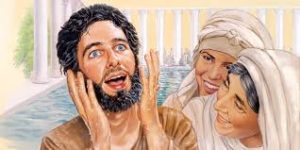
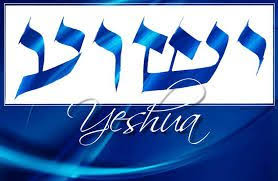
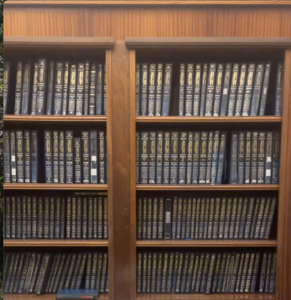




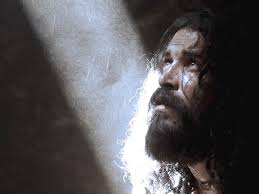

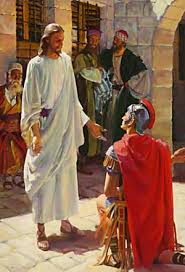
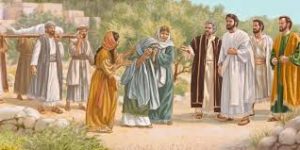
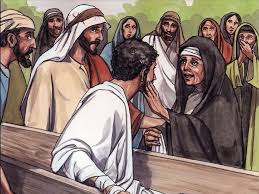

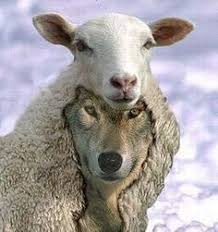

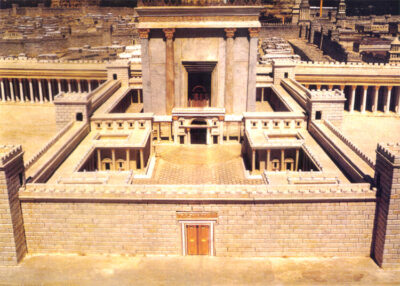 The steps down into the ritual bath (in an impure state) were
The steps down into the ritual bath (in an impure state) were 

